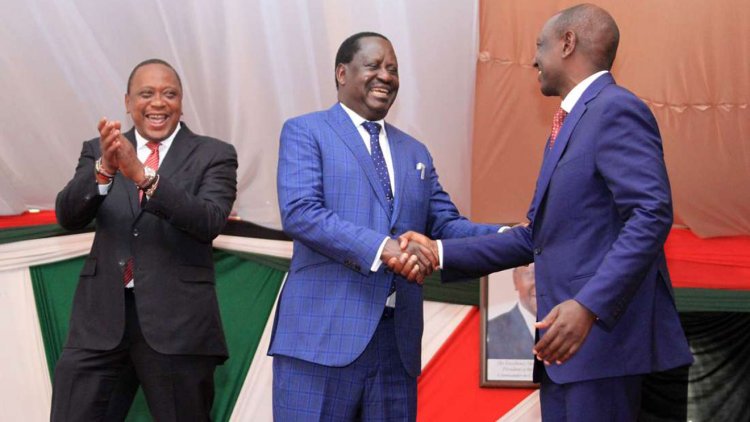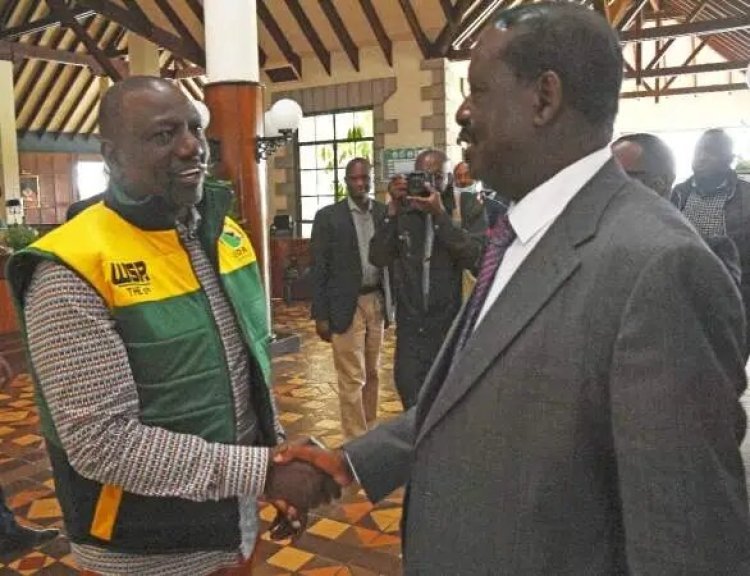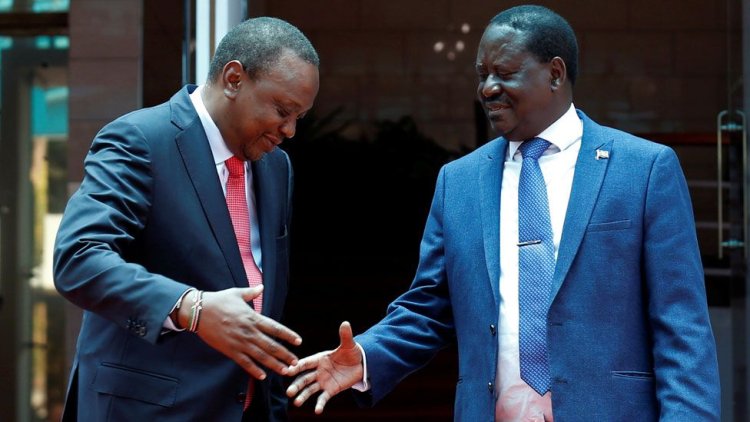5 Times Raila Has Struck Handshake Deals With Kenya's Presidents
The 78-year-old has had a political career stretching back over 40 years and can best be compared to a cat with nine lives.

Azimio la Umoja leader, Raila Odinga, is known for many things in Kenya, and a handshake is one of the most common associations about him.
The 78-year-old has had a political career stretching back over 40 years and can best be compared to a cat with nine lives. He's been through a number of country-shaking political events and has formed alliances or some sort of agreement with four of the country’s presidents when least expected along the way.
Except for the late Mzee Jomo Kenyatta, Raila has traversed every president in Kenya with 'handshakes' and offered different terms and conditions as an accompaniment, from the most surprising being former President Uhuru Kenyatta in 2018 to the recent 'bipartisan' agreement with President William Ruto.

Raila Odinga and William Ruto when they met at Windsor hotel on June 29, 2022. /K24 DIGITAL
Viral Tea takes a look at the five times Raila has struck handshake deals with Kenya's four presidents:
Memorandum of Understanding (MoU) with President Daniel arap Moi
In 1997, Raila and then-president Daniel Moi (now deceased) joined hands in a political move that sent shockwaves amongst many considering Moi had earlier fallen out with the former Prime Minister and twice detained him for nine years.
In the terms of this political agreement christened Memorandum of Understanding (MOU), Raila agreed to dissolve his National Development Party (NDP) party to join Moi’s Kenya Africa National Union (KANU), which saw him bestowed a slot as KANU’s secretary general and Minister for Energy.
The deal however lasted a few years as Raila would dump KANU after he disagreed with Moi’s choice of Uhuru Kenyatta as his successor.
Raila Backs Kibaki For President ('Kibaki Tosha')
Raila then backed Kibaki’s presidential candidature for 2002 and campaigned for his presidency in tough conditions including a time when the presidential candidate was involved in a grisly road accident and had to be flown to the United Kingdom (UK) for specialized treatment.
He was rewarded with a slot as Minister of Roads, but frosty relations emerged when Kibaki and Raila fell out soon after, with Raila claiming he had been politically shortchanged. Kibaki responded by firing him from the government.
Peace Accord With Kibaki After 2007/08 Post-Election Violence
Raila contested for the presidency in 2007 and finished second to President Kibaki, though in controversial circumstances. He refuted the results as the country degenerated into widespread violence in which over 1,000 people died and hundreds of thousands of others were injured and displaced.
Later, talks led by former UN secretary-general Koffi Anan led to a peace accord in which Kibaki and Odinga shook hands in public in the presence of then Tanzania president Jakaya Kikwete.
Raila was appointed Prime Minister and handed half of the ministries in government in an arrangement dubbed ‘nusu mkate’ (half a loaf) as part of the agreement. The deal lasted five years, until the end of Kibaki’s tenure as Head of State.
Raila-Uhuru Handshake
The unexpected handshake between former President Uhuru Kenyatta and Raila on March 9, 2018, was a watershed event and it was so surprising that it caught Kenyans unawares in the morning hours.
The August 2017 general election was marred with violence, and claims of rigging led to the Supreme Court nullifying Uhuru's victory, stating that there were illegalities and irregularities in the election.
Raila however refused to contest the repeat poll slated for October 26, saying the IEBC had failed to institute reforms to forestall “illegalities and irregularities.” The violence saw protesters clash with police and more than 66 people died.
As though that was not enough, Raila took an unofficial oath on January 30, 2018, when he was sworn in as the People’s President at Uhuru Park in Nairobi.
The infamous 'handshake' brought an end to the acrimony between leading political parties and tribes and promised to usher in a new era of peace, with the two leaders pledging to work together to address ethnic division, corruption, and historical injustice.

Uhuru Kenyatta and Raila Odinga during the 'handshake' in 2018. /BBC
During the launch of the Building Bridges Initiative (BBI), Raila intimated that the Handshake was born out of a 19-hour meeting with his archrival and that it “was not easy”.
“When we met with Mr Odinga we took tea for almost 45 minutes without having any discussion. All we could ask each other is how is home... how is your wife... how are the kids? There was nothing else we could talk about because of the anger from the insults we had been hurling at each other,” Uhuru shared.
While the two buried their hatchet, Kenyatta's deputy at the time, William Ruto claimed that he was left out, and thereafter side-lined from the government. The former president would later support Raila in the August 2022 General Election and heavily campaigned for him but Ruto emerged as the winner.
Ruto-Raila 'Bipartisan' Talks
Raila again lost the elections to President Ruto and the subsequent Supreme Court petition that he sought to overturn his win. Buoyed by an alleged report by a whistle-blower, Odinga first held public barazas across the country and later scaled that up to mass protests.
Despite promising that the protests would be peaceful, chaotic battles between protesters and the police were characterised by wanton looting and destruction of property, lives lost, injuries, a series of arrests and an economy in danger of sliding deeper into the black hole.
Three weeks later, Ruto urged Raila to call off the weekly nationwide demonstrations while agreeing to reconstitute the selection panel for the IEBC through a bipartisan parliamentary process, which was one of Raila's demands during the demonstrations.
Two hours after the President's address, the former Prime Minister called off the protests temporarily, accepting Ruto's call for dialogue over the constitution of the Independent Electoral and Boundaries Commission (IEBC).
Raila and Ruto are on record stating that they would not enter into corporation deals in form of a 'handshake'.






